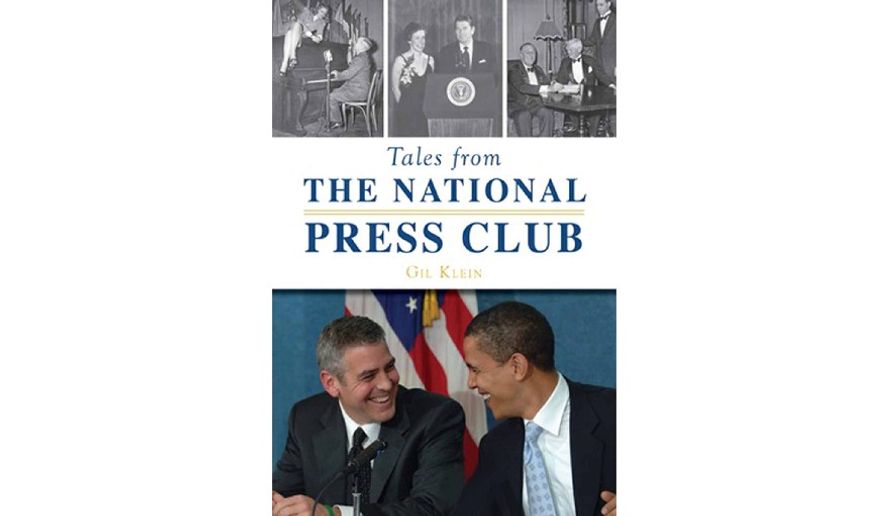OPINION:
As current National Press Club President Michael Freedman points out in his foreword to this engaging pocket history of one of Washington’s most colorful institutions, “The National Press Club is ‘the stuff of legends,’ most of which have the added benefit of being true.” Substitute the word “many” for the word “most” and the argument is unassailable.
Founded in 1908, the NPC was already middle-aged when I first set foot in it nearly 60 years ago as a guest of the late Jim Lucas, a veteran Scripps Howard combat correspondent I had interviewed as a student panelist on an early television public affairs show called “Youth Wants to Know.” It was love at first sight and I promised myself then and there that one day I would be a member, too. Within a decade I was. Nearly half a century later — and with many ups and downs for the club in the intervening years — I still am.
One of the more memorable moments I witnessed first-hand was both an upper and a downer. On her last official visit to Washington as prime minister of India, the late Indira Gandhi’s appearance as luncheon speaker was delayed for about 20 minutes when the elevator she was riding in got stuck somewhere between the lobby and the 13th floor of the National Press Building, where the club is housed. Gandhi seemed to enjoy the irony of the thing: The leader of an “emerging” nation stuck in a defective elevator in the capital city of the world’s technological superpower.
Gil Klein, a past president of the NPC and a distinguished Washington journalist of long standing, has done an excellent job of collecting a representative — and highly amusing — collection of historic, dramatic and occasionally farcical episodes from the club’s rich history.
The book is divided into nine chapters ranging from the club’s founding, through World War I and Prohibition, the Roaring ’20s, the FDR era, the 1950s, Camelot to Watergate, the Carter-Reagan-Bush years, the early post-Cold War 1990s and, finally, what Mr. Klein calls “The Angst of the Twenty-First Century.” Through it all, the NPC has provided a front-row seat — not to mention a frequent on-stage presence — as history unfolded around it.
When I first joined, there remained a few active old-timers frequenting the bar and card room who had been cub reporters when Woodrow Wilson was president. Today, there is still a sprinkling of members who cut their journalistic teeth in the Vietnam and Watergate eras. They must seem very much the same sort of exotic relics to today’s junior members as the Wilsonian antiques did to me when I was a young newcomer.
Mr. Klein shares anecdotes about both celebrated members and even more celebrated guests who made or reported history at the NPC. To cite just a few from the guest list, every single American president since Teddy Roosevelt, Anwar Sadat, several Israeli prime ministers, Nikita Khrushchev, Martin Luther King Jr., Fidel Castro, Elizabeth Taylor, Lauren Bacall, Louis Armstrong, and countless other political, film, TV and recording stars have used the club as a global forum.
The club scored a double historic first in February 1982. It inaugurated its first woman president, Vivian Vahlberg. On top of that, the oath of office, accompanied by some characteristic quips, was administered by the incumbent president of the United States (and a former syndicated commentator himself), Ronald Reagan. Mr. Klein quotes the Reagan remarks at length but since, as Reagan’s director of presidential speechwriting at the time, I drafted them, I will confine myself here to the modest closing lines:
“[D]o you promise to keep the National Press Club a warm and vital place where writers, reporters, newsmakers and other questionable types meet to formally and informally exchange views, ideas and plain good fellowship, to maintain what is finest in its past and work to build its future as a major world news center? If so, please signify by saying, ‘I do’ … All right then, Vivian. As a retired journalist, as a proud member of the National Press Club, and as the chief executive of another Washington concern with deficit problems, I now pronounce you president of the National Press Club.”
Reagan, the most conservative American president of the post-World War II era, received an enthusiastic ovation that evening from what even then was a predominantly liberal and Democratic-leaning group of elite journalists. It is hard to imagine anything quite like that happening today. Different people can assign the blame in different directions, but our country is surely the poorer for it.
• Aram Bakshian Jr., a former aide to Presidents Nixon, Ford and Reagan, has written widely on politics, history, gastronomy and the arts.
• • •
TALES FROM THE NATIONAL PRESS CLUB
By Gil Klein
History Press, $21.99, 208 pages




Please read our comment policy before commenting.